Proteus: Prophetic Greek Sea God Who Knew All Things, Past, Present And Future
A. Sutherland - AncientPages.com - In Greek mythology, Proteus was a sea god, son of Poseidon and Tethys, and sometimes said to be Poseidon's attendant.
His name probably means "firstborn," "first," or "primordial," and he belongs to the so-called "sea elders."
Aristaeus fettering Proteus by Sébastien Slodtz (1655–1726). Palace of Versailles. Source
Like many other gods of the sea, Proteus was an amphibious being, which means these gods could live alternately in the water and on land. Proteus was believed to live on Faros (Pharos) island in ancient times, an island off Alexandria, Egypt. Like many other sea gods, he was a divine being but did not give up his knowledge voluntarily.
He had the gift of foretelling the future and knew the past, present, and future; time had no secret for him. He also could change his form at will hence the expression "protean shape" (resembling Proteus in having a varied nature or avoiding those who wanted to question him by changing his shape). In modern times, a changeable human can be called "a Proteus nature."
As Proteus could transform, he was, therefore, challenging to defeat. He could change his form rapidly into a snake, lion, snake, panther, and much more, and he did it very often to avoid being questioned. In this case, Proteus gave no answers to all the insistent questions.
In Odyssey, the legendary Greek author Homer described Proteus as an 'elder man of the sea' who has the habit of emerging from the sea at noon to rest in the shadow of the rocks, surrounded by the flock of Poseidon's seals. As legend has, it was the most proper time to approach him to get some advice or prophecy from the diviner.
 Illustration of Proteus by Andrea Alciato from The Book of Emblems (1531) Public Domain
Illustration of Proteus by Andrea Alciato from The Book of Emblems (1531) Public Domain
However, it was not easy to force him to do so since he was powerful and volatile like the sea, and even if he exercised the gift of prophecy, he did it most reluctantly.
Menelaus' Encounter With Proteus
Among those who managed to obtain a prophecy from Proteus was Aristaeus, the god of bee-keeping and son of Apollo and the huntress Cyrene. Once, Aristaeus lost all his bees because of a disease. His mother, Cyrene, said that Proteus could explain how to prevent another such disaster but would only do so if compelled. Aristaeus had to seize Proteus and hold him, no matter what kind of disguise he chose.
Finally, Proteus gave up and told him that the bees' death was a punishment for causing the death of Eurydice. To make amends, Aristaeus needed to sacrifice 12 animals to the gods, leave the carcasses in the place of sacrifice, and return three days later. He followed these instructions, and upon returning, he found a swarm of bees in one of the carcasses that he took to his apiary.
The bees were never again troubled by disease.
Also, Menelaus, the Spartan king, got advice from Proteus, who explained what was needed to return from Egypt to Sparta.
"After the Trojan War, Menelaus, king of Sparta, and Agamemnon king of Mycenae were about to sail back to Greece, when Menelaus said:
'Let's sail once, while there is a breeze.', But his brother Agamemnon disagreed with him:
'No, no, let's make a sacrifice to Athena first.'
'We Greeks, we don't owe Athena anything!' 'She defended the Trojan citadel too long,' Menelaus said.
The two brothers had very different opinions. They separated and unfortunately never saw each other again.
Proteus, A Greek Sea God Who Possessed is a drawing by Mary Evans Picture Library which was uploaded on January 10th, 2018. source
Agamemnon, Diomedes, and Nestor had a successful journey back home, while Menelaus was surprised by a storm that Athena had sent, and he lost all his ships except five. These were taken to Crete, where Menelaus crossed the sea to Egypt and spent eight years in the southern waters, but he could not sail home without good winds. He visited Cyprus, Ethiopia, Phoenicia, and Libya and was treated with honor and hospitality.
Finally, Menelaus arrived at the island of Faros, where he met the sea-nymph Eidoethea. She told him that he must capture her father, Proteus, the shepherd of fish and other sea animals. She said her father knew everything, past, present, and future. Proteus would tell Menelaus how to raise good winds to sail home.
Eidoethea explained that Proteus would rise from the waters to the zephyr's breath when the sun is in the middle of its path. He will first count the seals (Proteus' favorite animals) in groups of five, and after this, he will lie in their midst like a shepherd among his flock. She instructed Menelaus on what to do and then disappeared into the sea.
The following day, Menelaus and three companions disguised themselves as seals and lay waiting on the shore until they were joined at midday by hundreds of seals, Proteus's flock. The Proteus emerged from the sea and went to sleep among the seals: so Menelaus could seize him. Proteus tried to escape by changing form. He turned successively into a lion, serpent, panther, boar, a stream, but it did not help.
At last, Proteus resumed his original form and asked Menelaus what he wanted from him. The king said that he was searching for the latest news of events in Greece to be ready for his return. Proteus told him his kingdom was safe, but his brother Agamemnon had been murdered in Mycenae, and Odysseus was being held against his will by the sea-nymph Calypso.
The older man of the sea also advised the hero to return as soon as possible to Egypt and make a sacrifice to the gods, and so Menelaus did.
A wind, for which they all were waiting so long, finally reached them, and they could sail home.
Written by – A. Sutherland - AncientPages.com Senior Staff Writer
Updated on January 22, 2024
Copyright © AncientPages.com All rights reserved. This material may not be published, broadcast, rewritten or redistributed in whole or part without the express written permission of AncientPages.com
Expand for referencesReferences:
Freeman Ph. Oh My Gods: A Modern Retelling of Greek and Roman Myths
Robert Graves, The Greek Myths
More From Ancient Pages
-
 DNA Identifies Historical Remains Of George Washington’s Relatives
DNA | Mar 29, 2024
DNA Identifies Historical Remains Of George Washington’s Relatives
DNA | Mar 29, 2024 -
 Surprising Evidence Of 12,000-Year-Old Unknown Advanced Secret Knowledge Held By Elite Individuals – The Article – Part 1
Ancient Mysteries | Feb 4, 2021
Surprising Evidence Of 12,000-Year-Old Unknown Advanced Secret Knowledge Held By Elite Individuals – The Article – Part 1
Ancient Mysteries | Feb 4, 2021 -
 Mysterious Lost Tartessian Civilization And Its Ancient Tablet With Paleo-Hispanic Alphabet
Archaeology | Jun 15, 2024
Mysterious Lost Tartessian Civilization And Its Ancient Tablet With Paleo-Hispanic Alphabet
Archaeology | Jun 15, 2024 -
 Central Asia Identified As A Key Region For Human Ancestors
Archaeology | Oct 22, 2022
Central Asia Identified As A Key Region For Human Ancestors
Archaeology | Oct 22, 2022 -
 Another Franklin Expedition Crew Member Identified
Archaeology | Sep 26, 2024
Another Franklin Expedition Crew Member Identified
Archaeology | Sep 26, 2024 -
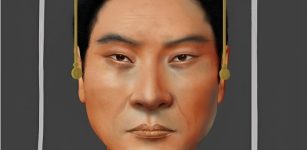 Facial Reconstruction Of Chinese Emperor Wu Who Lived 1,500 Years Ago
DNA | Mar 29, 2024
Facial Reconstruction Of Chinese Emperor Wu Who Lived 1,500 Years Ago
DNA | Mar 29, 2024 -
 St. Swithin’s Day And The 40 Days’ Weather Prophecy
Featured Stories | Jul 15, 2023
St. Swithin’s Day And The 40 Days’ Weather Prophecy
Featured Stories | Jul 15, 2023 -
 Bronze Age ‘Washingborough Boat’ Will Reveal Boat Building Techniques Of Ancient People
Archaeology | May 11, 2017
Bronze Age ‘Washingborough Boat’ Will Reveal Boat Building Techniques Of Ancient People
Archaeology | May 11, 2017 -
 How Did Mesopotamia Change The World?
Civilizations | Jan 18, 2020
How Did Mesopotamia Change The World?
Civilizations | Jan 18, 2020 -
 Neanderthals And Other Ancient Humans Were Much More Intimate Than Previously Thought – DNA Shows
DNA | Jul 12, 2024
Neanderthals And Other Ancient Humans Were Much More Intimate Than Previously Thought – DNA Shows
DNA | Jul 12, 2024 -
 Unusual Power Of Seidr: Norse Shamans Used Magic To Alter Destiny And See The Future
Featured Stories | Oct 14, 2017
Unusual Power Of Seidr: Norse Shamans Used Magic To Alter Destiny And See The Future
Featured Stories | Oct 14, 2017 -
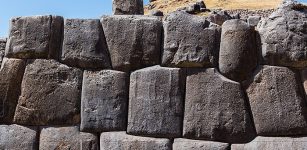 30,000-Year-Old Hidden Writing Found At Sacsayhuamán Temple Could Re-Write History
Civilizations | Jun 24, 2014
30,000-Year-Old Hidden Writing Found At Sacsayhuamán Temple Could Re-Write History
Civilizations | Jun 24, 2014 -
 Tiresias – Unusual Prophet Who Turned Into A Woman For Seven Years
Featured Stories | May 16, 2020
Tiresias – Unusual Prophet Who Turned Into A Woman For Seven Years
Featured Stories | May 16, 2020 -
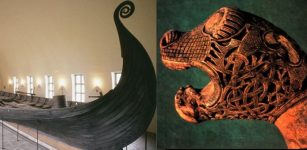 Oseberg Ship: Amazingly Well-Preserved Viking Burial Ship
Featured Stories | Jun 15, 2016
Oseberg Ship: Amazingly Well-Preserved Viking Burial Ship
Featured Stories | Jun 15, 2016 -
 Unexpected Underwater Discovery Of 50,000 Ancient Coins Off Sardinia Hints At Hidden Shipwreck
Archaeology | Nov 10, 2023
Unexpected Underwater Discovery Of 50,000 Ancient Coins Off Sardinia Hints At Hidden Shipwreck
Archaeology | Nov 10, 2023 -
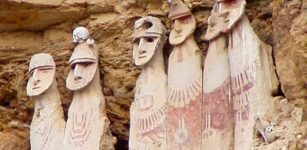 Mysterious Sarcophagi Belonging To The Chachapoyas The Cloud Warriors
Archaeology | Mar 4, 2014
Mysterious Sarcophagi Belonging To The Chachapoyas The Cloud Warriors
Archaeology | Mar 4, 2014 -
 On This Day In History: Vasco De Gama Departed On First European Voyage To India – On July 8, 1497
News | Jul 8, 2016
On This Day In History: Vasco De Gama Departed On First European Voyage To India – On July 8, 1497
News | Jul 8, 2016 -
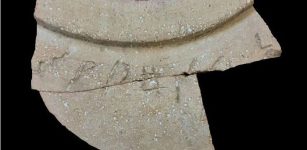 Puzzling Sabaean Inscription Found On A Large Clay Jar Near The Jerusalem Temple Deciphered
Archaeology | Apr 4, 2023
Puzzling Sabaean Inscription Found On A Large Clay Jar Near The Jerusalem Temple Deciphered
Archaeology | Apr 4, 2023 -
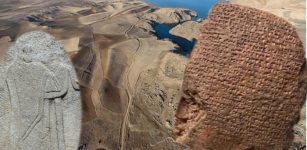 3,300-Year-Old Hittite Cuneiform Tablet Found In Büklükale Deciphered!
Archaeology | Apr 2, 2024
3,300-Year-Old Hittite Cuneiform Tablet Found In Büklükale Deciphered!
Archaeology | Apr 2, 2024 -
 Mystery Of Marquis of Haihun: 2,000-Year-Old Royal Coffin Opened In China
Archaeology | Apr 20, 2016
Mystery Of Marquis of Haihun: 2,000-Year-Old Royal Coffin Opened In China
Archaeology | Apr 20, 2016


